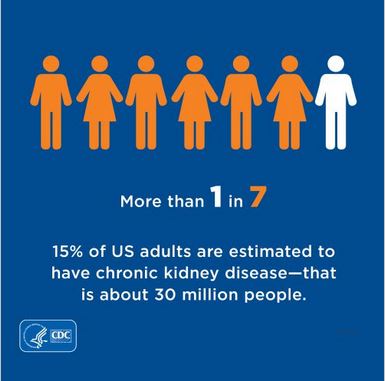CKD: The Early Signs, Risk Factors and Diagnosis of Chronic Kidney Disease
 |
CKD (chronic kidney disease) affects more than 1 in 7 adults in the US and takes its toll physically, emotionally and financially on individuals and countries as a whole. Please note that this summary is not meant to replace information from your doctor. Please consult your doctor if you have any questions or concerns. |
How is CKD Defined?
Chronic kidney disease is usually assessed by at least 2 variables, one from the blood, the estimated GFR, and one from the urine, the measured albumin level. Other blood tests, imaging tests and biopsies may also be performed.
GFR is an acronym for "glomerular filtration rate." It estimates how much blood is filtered through the filtering bodies in the kidneys (the glomeruli) each minute based on your creatinine level, your age, your gender and your race. Your GFR helps you know how much kidney function you have. A GFR less than 60 for 3 months or more, or a GFR above 60 with high albumin, means you probably have chronic kidney disease. Blood in the urine may also be a sign of kidney disease.
Creatinine is a waste product produced by normal muscle breakdown and released into the blood. Blood creatinine is one of the variables in the calculation of the GFR. Almost all creatinine is filtered from the blood by the kidneys and released into urine. A higher-than-normal creatinine blood level usually means that the kidneys are not able to function properly to remove the creatinine from the blood into the urine. The urine levels can be measured during a random urine test or a 24-hour urine collection test.
Albumin is a type of protein circulating in your blood, not in your urine. Having albumin in your urine (called “albuminuria”) for three months or more likely means you have chronic kidney disease and are at risk of CKD progressing to kidney failure. Healthy kidneys should not excrete albumin. While albumin found in the urine can be caused by other conditions such as high blood pressure, illness, heavy exercise, urinary tract infections, smoking or poor blood sugar control, it is typically a sign of kidney damage, and the test should be repeated for validation.
The albumin-creatinine ratio (ACR) is commonly checked against the GFR to determine the stage of chronic kidney disease you are in.
What Are Early Signs of CKD?
In most cases, there are no symptoms in the early stages of chronic kidney disease. However, if you notice any of these symptoms, please see a doctor for CKD screening:
- Fatigue, weakness
- Difficult, painful urination
- Foamy urine
- Pink, dark urine (blood in urine)
- Increased need to urinate (especially at night)
- Puffy eyes
- Swollen face, hands, abdomen, ankles, feet
- Increased thirst
- High blood pressure
- Blood in urine
What Are the Typical Risk Factors for CKD?
Kidney function is known to decrease with age, but you cannot blame that solely on simple aging. Many of our dietary and lifestyle factors play a huge role in that.
Major risk factors for chronic kidney disease are:
- Obesity
- Diabetes
- High blood pressure
- A family history of kidney failure
- Age 60 or older
- African-American, Hispanic, Asian, Native American, or Pacific Islander descent.
Drugs such as pain medications, alcohol, some antibiotics, prescription laxatives, contrast dye and illegal drugs can all injure the kidneys since they will pass through the kidneys. Research in 2015 showed that proton-pump inhibitors are associated with increased risk of chronic kidney disease. Kidney stones, some congenital disorders, some autoimmune disorders like lupus and chronic urinary tract infections are also risk factors.
The good news is that, according to the National Kidney Foundation, chronic kidney disease can be treated. According to them, with early diagnosis and treatment, it is possible to slow or stop the progression of kidney disease.
Why Are the Kidneys So Important and How Do You Care for Them?
To learn more about what the kidneys do, why they are so important, and what is missing from conventional CKD treatment, please see this page.
Return to Health Benefits page.
I research studies and share my clinical experience to write this free site to help you find solutions to your problems. As part of that, I recommend products and services that I genuinely believe will be of help to you. If you click on a link to a product/service, I may receive a small commission to support my efforts if you buy something. The item does not cost you more.
Thanks for visiting this site! If you've enjoyed reading this page or have found the information to be useful to you, please "like", tweet about it, or share it so others can benefit, too. You can leave comments below via Facebook or Disqus.
Comment with Disqus (including as a guest), Twitter or Google accounts:
If you are one of my many readers without a Facebook account, you can still comment.
Disclaimer: Please note: By law, I cannot provide any personalized recommendations for your specific health concern on this site. The information contained in this site is educational in nature and is not intended as diagnosis, treatment, prescription or cure for any physical or mental disease, nor is it intended as a substitute for regular medical care. Consult with your doctor regarding any health or medical concerns you may have.
Subscribe to my occasional newsletter and receive a free copy of "How to Use Probiotics to Lose Weight and Be Healthier".

To comply with the EU's GDPR data privacy regulation, please subscribe here:
Looking for some quality professional supplements, including probiotics? Check out my online dispensary, as I will be doing reviews of some of these products in the future. Click on the Fullscript picture. (Note: If you were a former Wellevate customer, please switch to Fullscript for a better customer experience. Thanks!)
Some competitors of SBI (Solo Build It) are posting fake negative reviews of SBI. If you are considering creating your own website business, or if you have a brick-and-mortar business but want an online presence, I highly recommend SBI!





Comment with Facebook!
I'd love to hear your opinion about what you just read. Leave me a comment in the box below! Other commenting options follow the Facebook comments.